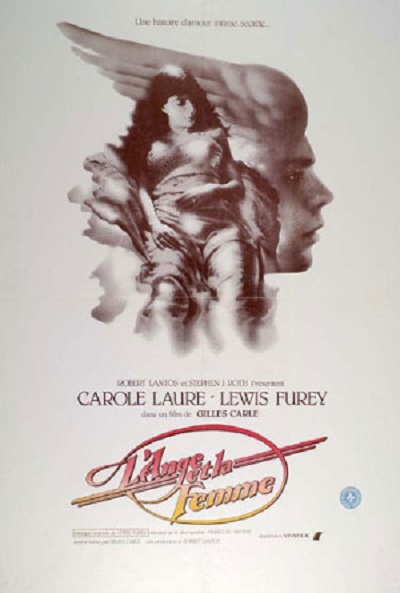 I’m really not sure what to make of this one. It’s a black and white Canadian art film from the seventies with supernatural overtones, pornographic interludes and a stern message about the downside of free will and the futility of violence…or something.
I’m really not sure what to make of this one. It’s a black and white Canadian art film from the seventies with supernatural overtones, pornographic interludes and a stern message about the downside of free will and the futility of violence…or something.
Carole Laure and Lewis Furey, who play the title characters of THE ANGEL AND THE WOMAN (L’ANGE ET LA FEMME), are a real-life couple. The gorgeous Laure, whose mesmerizingly exotic looks are a large part of what makes this film so effective (and go a long way toward carrying us through the boring parts, of which there are quite a few), is a big star in French Canadian cinema, while her husband is probably best known for his early career as a porno star (which I’m sure served as excellent preparation for his role in this film).
Writer-director Gilles Carle is himself a prolific figure in French Canadian cinema, but, like the majority of his colleagues (Michel Poulette, Denis Villeneuve, Andre Turpin, to name a few) is mostly unknown outside that realm. Co-producer Robert Lantos, on the other hand, has gone on to become one of the Canadian film industry’s leading players, overseeing films by the likes of Atom Egoyan, David Cronenberg and Denys Arcand, and co-founding the mighty Alliance Communications (now Alliance-Atlantis). I can’t help but wonder what Lantos thinks of this 1977 film, his first time out as a producer, nowadays (the fact that it has never been legitimately released on video or DVD seems a telling indicator).
The bullet-ridden corpse of a strikingly beautiful woman lies on a snowbound plain. A man gathers her up and takes her to a nearby cottage, where he reveals himself to be the Angel Gabriel. He brings the woman back to life by breathing smoke on her wounds, thus setting the stage for an agonizingly slow, protracted first act where very little happens.
Predictably, the angel falls in love with the woman (who can blame him?), which leads to some lengthy sex scenes, at least one of which ventures into hardcore territory (albeit of the Painfully Arty variety). Gabriel also has his reeeeeeeally old (200-plus years!) parents show up for a brief meal and invites some pretentious artsy-fartsy types to participate in a lengthy chat about nothing.
The story takes a left turn in the third act, when Gabriel teaches the woman to incinerate objects with a gaze. Emboldened by her newfound powers, she decides to track down the slimeballs who kidnapped and left her for dead. Against Gabriel’s strenuous objections, the woman travels into a teeming city where she tracks down the scumbags (all conveniently clustered around a table) and lets loose on ‘em.
!!!SPOILER ALERT!!! Suddenly we’re catapulted back to the time of the kidnapping; the evil men gag the woman, drive her out to the snowy wilderness where the film began, shoot her repeatedly and drive off. Gabriel once again appears, just as he did in the beginning, but his actions this time around are different. By squandering her time on acts of violence, it seems, the woman has forfeited her chance for a new life. Instead of carrying off her body, the angel kneels before her, utters a silent cry of anguish and disappears.
This film is not terribly distinguished visually, and its low budget is painfully evident throughout. With near-catatonic pacing and stark black and white photography, it’s very much an ART film, although the pornographic sex scenes add an extra dimension, as do the supernatural elements and bleak snowbound setting.
THE ANGEL AND THE WOMAN, it must be said, is a quintessentially Canadian film. The minimalist story and settings attest to that, as do the pacifistic leanings (if this was an American movie, the woman’s climactic act of revenge would most likely be applauded). The grim finale also attests to a uniquely Canadian sensibility; it’s been said that a large percentage of the world’s most depressing films come from Canada, and after experiencing this uncompromisingly harsh, melancholic vision, I can believe it.
Vital Statistics
THE ANGEL AND THE WOMAN (L’ANGE ET LA FEMME)
Films RSL
Director: Giles Carle
Producers: Robert Lantos, Stephen J. Roth
Screenplay: Giles Carle
Cinematography: Francois Protat
Editor: Ophera Hallis
Cast: Carole Laure, Lewis Furey, Stephen Lack, Jean Comptois, Joe Elsnor, Conrad Peterson, Stephen J. Roth
